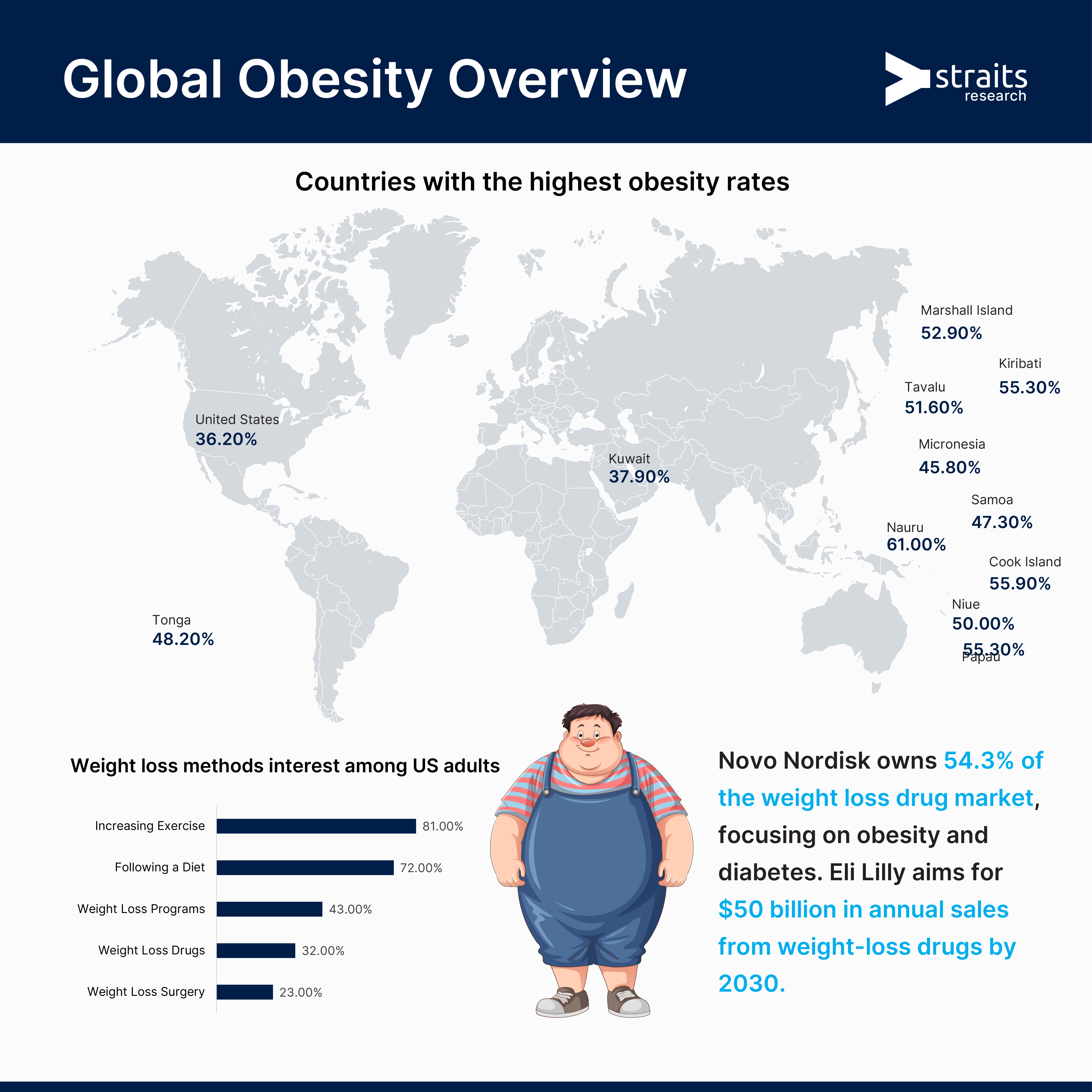How are weight loss drugs shaping the global economy?

Cultural conventions, food choices, physical activity levels, and environmental variables all contribute to the global obesity epidemic. With over 1 billion obese people worldwide, the health and economic repercussions are enormous. According to the World Health Organization (WHO), roughly 167 million individuals worldwide may have health difficulties as a result of being overweight or obese by 2025.
Surprisingly, Nauru leads the globe in obesity rates, with 61% of its population obese. Cook Island has 55.9%, Palau has 55.3%, Marshall Islands has 52.9%, Tuvalu has 51.6%, Niue has 50.0%, Tonga has 48.2%, Samao has 47.3%, Kiribati has 46.0%, Micronesia has 45.8%, Kuwait has 37.9%, and the United States has 36.2%.
Causes and Consequences
According to the World Health Organization (WHO), 39% of persons aged 18 and above are overweight, and 13% are obese. The prevalence rises with age, with 47% of persons aged 50-59 overweight and 21% obese, while 57% of those aged 60 and older are overweight and 28% obese. According to a recent global study, 45% of people worldwide are actively aiming to reduce weight, while the remaining 23% are working to maintain their present weight.
According to a 2023 survey in the United States, 81% of those looking to lose weight were interested in improving their physical activity, while 72% were interested in following specific diets. Furthermore, 43% were interested in weight loss programs, 32% in weight loss drugs, and 23% in weight loss surgery for fat reduction.
Economic Impact
Moreover, Novo Nordisk has emerged as the global leader in weight loss drugs, with a commanding 54.3% market share. Eli Lilly, on the other hand, expects weight-loss medications to generate $50 billion in yearly sales by 2030, with their investigational treatment, retatrutide, showing good results in clinical testing. The industry is also dominated by large players such as Pfizer, Amgen, AstraZeneca, Novartis, Viking Therapeutics, and Structure Therapeutics.
However, there is a large gap in prescription prices, particularly in the United States. For example, Novo Nordisk's Ozempic and Wegovy medicines cost over $1,000 in the United States but only a few hundred euros in Germany. Similarly, Wegovy costs $1,349 per month in the United States but only $328 in Germany. This pricing disparity continues across several weight reduction medicines, with prices in the United States ranging from $936 to $1,349 per month, compared to much lower rates in peer countries ranging from $169 to $319.
Furthermore, the economic burden of obesity globally exceeds $1.7 trillion, with $1.24 trillion attributed to lost productivity. Corporations are becoming more aware of the impact of employee obesity on productivity and absenteeism, resulting in an increase in demand for weight loss medications as part of corporate benefits packages. In fact, obese workers missed 25% more workdays, resulting in an estimated $8.65 billion in lost productivity each year in the U.S.
Employers are beginning to see the potential benefits of integrating weight reduction medications into their health plans. While less than half of major companies now cover these medications, another 18% are contemplating adding them to their plan offerings. Weight reduction medications are seen as a beneficial component of employee wellness initiatives, with the potential to reduce healthcare expenses by 20-55%.
The increase in demand for weight loss drugs reflects a rising awareness of the economic and health consequences of obesity. Pharmaceutical companies are racing to discover creative solutions, and employers are considering incorporating weight loss medications into their benefits packages.




